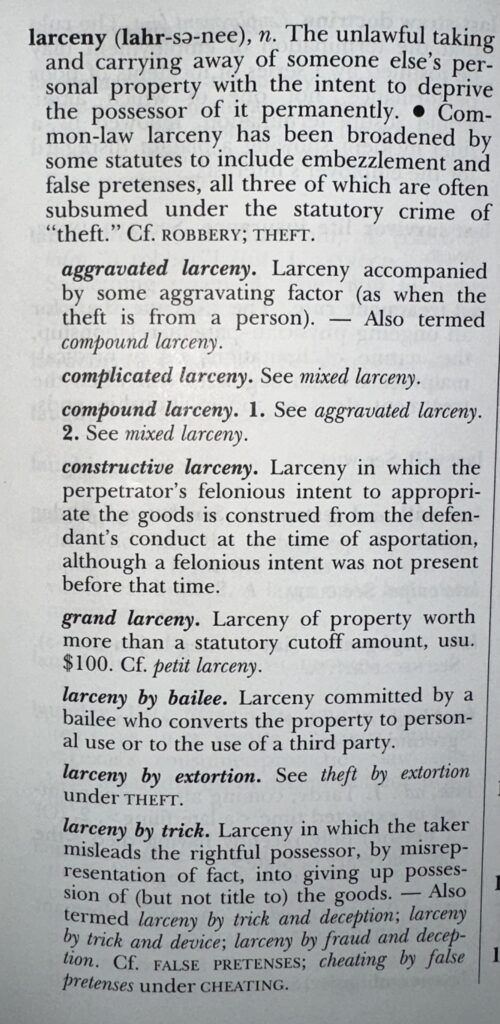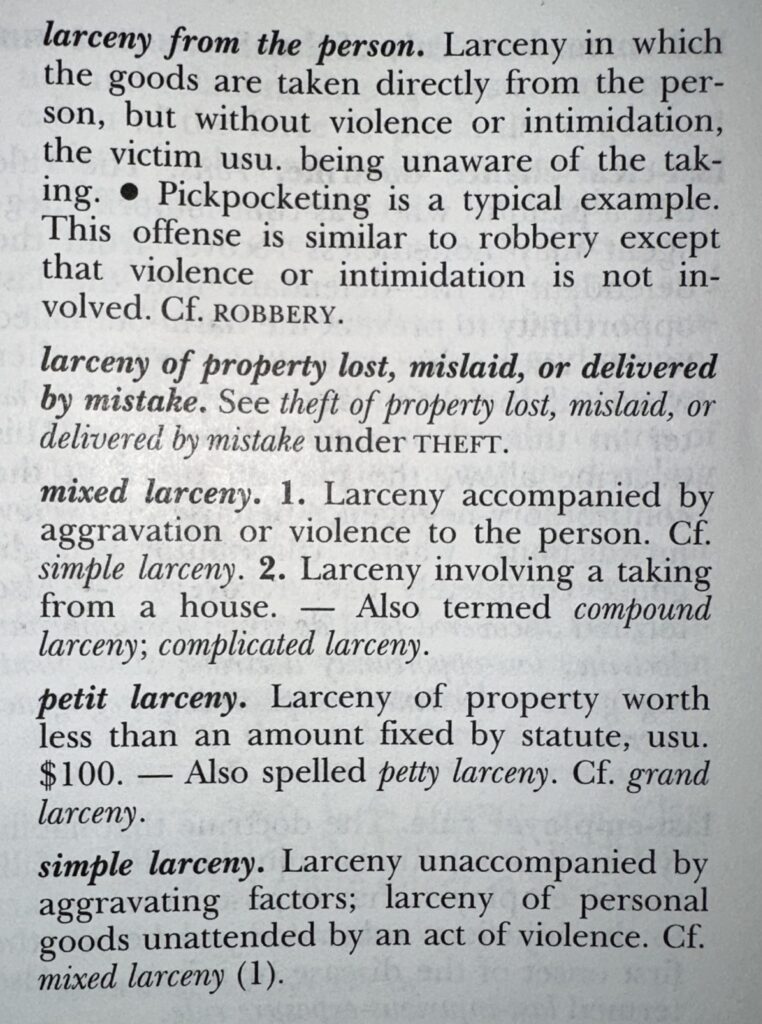Text contains those laws in effect on November 2, 2024
From Title 10-ARMED FORCES Subtitle A-General Military Law PART II-PERSONNEL CHAPTER 47-UNIFORM CODE OF MILITARY JUSTICE SUB CHAPTER X-PUNITIVE ARTICLES
§921. Art. 121. Larceny and wrongful appropriation
(a) Any person subject to this chapter who wrongfully takes, obtains, or withholds, by any means, from the possession of the owner or of any other person any money, personal property, or article of value of any kind-
(1) with intent permanently to deprive or defraud another person of the use and benefit of property or to appropriate it to his own use or the use of any person other than the owner, steals that property and is guilty of larceny; or
(2) with intent temporarily to deprive or defraud another person of the use and benefit of property or to appropriate it to his own use or the use of any person other than the owner, is guilty of wrongful appropriation.
(b) Any person found guilty of larceny or wrongful appropriation shall be punished as a court-martial may direct.
(Aug. 10, 1956, ch. 1041, 70A Stat. 73 .)
| Revised section | Source (U.S. Code) | Source (Statutes at Large) |
|---|---|---|
| 921(a)921(b) | 50:715(a).50:715(b). | May 5, 1950, ch. 169, §1 (Art. 121), 64 Stat. 140 . |
In subsection (a), the words “whatever” and “true” are omitted as surplusage. The word “it” is substituted for the words “the same” in clauses (1) and (2).


“larceny (lahr-sa-nee), n. The unlawful taking and carrying away of someone else’s personal property with the intent to deprive the possessor of it permanently. • Com-mon-law larceny has been broadened by some statutes to include embezzlement and false pretenses, all three of which are often subsumed under the statutory crime of
“theft.” Cf. ROBBERY; THEFT.
aggravated larceny. Larceny accompanied by some aggravating factor (as when the theft is from a person). – Also termed compound larceny.
complicated larceny. See mixed larceny. compound larceny. 1. See aggravated larceny.
2. See mixed larceny.
constructive larceny. Larceny in which the perpetrator’s felonious intent to appropriate the goods is construed from the defendant’s conduct at the time of asportation, although a felonious intent was not present before that time.
grand larceny. Larceny of property worth more than a statutory cutoff amount, usu.
$100. Cf. petit larceny.
larceny by bailee. Larceny committed by a bailee who converts the property to personal use or to the use of a third party. larceny by extortion. See theft by extortion under THEFT.
larceny by trick. Larceny in which the taker misleads the rightful possessor, by misrepresentation of fact, into giving up possession of (but not title to) the goods. – Also termed larceny by trick and deception; larceny by trick and device; larceny by fraud and decep-ton. Cf. FALSE PRETENSES; cheating by false pretenses under CHEATING.
larceny from the person. Larceny in which the goods are taken directly from the per-son, but without violence or intimidation, the victim usu. being unaware of the tak-ing. • Pickpocketing is a typical example.
This offense is similar to robbery except that violence or intimidation is not in-volved. Cf. ROBBERY.
larceny of property lost, mislaid, or delivered by mistake. See theft of property lost, mislaid, or delivered by mistake under THEFT.
mixed larceny. 1. Larceny accompanied by aggravation or violence to the person. Cf. simple larceny. 2. Larceny involving a taking from a house. — Also termed compound larceny; complicated larceny.
petit larceny. Larceny of property worth less than an amount fixed by statute, usu. $100. — Also spelled petty larceny. Cf. grand larceny.
simple larceny. Larceny unaccompanied by aggravating factors; larceny of personal goods unattended by an act of violence. Cf. mixed larceny (1).”

